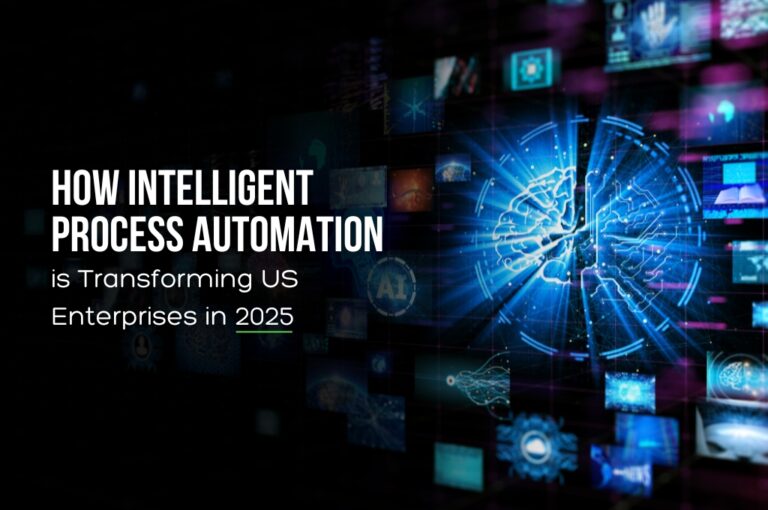In 2025, automation is no longer about just getting things done faster — it’s about doing them smarter. US enterprises are shifting from traditional robotic process automation (RPA) to Intelligent Process Automation (IPA) to gain more value from their digital transformation efforts.
Why the shift?
Because RPA alone can’t keep up with the complexity of today’s business operations. Enterprises are dealing with unstructured data, unpredictable workflows, and growing regulatory pressure. That’s where IPA steps in — combining RPA with artificial intelligence (AI), machine learning, and process analytics to make decisions, adapt in real time, and scale intelligently.
In this blog, we’ll explore what IPA really means, why it’s essential in 2025, and how leading US companies are already using it to transform everything from compliance to customer service.
What is Intelligent Process Automation (IPA)?
Intelligent Process Automation (IPA) is the next evolution of automation, one that combines robotic process automation (RPA) with technologies like AI, machine learning, natural language processing (NLP), and process mining.
While traditional RPA handles repetitive, rule-based tasks, IPA takes it further. It can learn from data, adapt to changes, and make decisions based on logic and patterns — not just pre-set rules.
For example, instead of simply extracting invoice data, an IPA system can identify anomalies, match payments, flag risks, and even recommend next steps – all without human intervention.
In short, IPA doesn’t just automate tasks – it orchestrates smart, end-to-end workflows that improve over time.
Why IPA Matters More Than Ever in 2025
In 2025, US enterprises are managing more complexity than ever before — hybrid workforces, massive data volumes, multi-system dependencies, and rising customer expectations.
Traditional automation simply isn’t built to handle this scale or nuance.
That’s why Intelligent Process Automation (IPA) is gaining traction. It doesn’t just automate steps – it learns from them. IPA can process unstructured data, respond to exceptions, and continuously improve outcomes across departments.
Whether it’s ensuring compliance, accelerating service delivery, or cutting operational waste, IPA helps businesses do more with less – and do it intelligently.
Enterprises that fail to upgrade to smarter automation risk falling behind those that are already unlocking speed, insight, and efficiency through IPA.
Core Benefits of Intelligent Process Automation
Intelligent Process Automation delivers more than just efficiency — it reshapes how work gets done. Here are some of the biggest advantages US enterprises are seeing in 2025:
- Smarter Decision-Making: IPA uses AI and data analysis to make informed decisions in real-time, minimizing human error and subjectivity.
- Operational Cost Savings: By automating complex workflows, businesses can significantly reduce the need for manual intervention and rework.
- Scalability Across Teams: IPA systems adapt easily to new volumes, systems, and departments — without needing a complete rebuild.
- Improved Compliance & Audit Readiness: With full visibility into processes, audit trails and regulatory requirements are easier to manage.
- Employee Productivity: Teams spend less time on repetitive tasks and more on strategic, high-value work.
In a highly competitive market, these benefits aren’t just nice to have — they’re essential for staying ahead.
Use Cases Across US Enterprises
In 2025, Intelligent Process Automation is being applied across industries to streamline workflows, improve decision-making, and reduce costs. Here are some standout examples:
- Finance: IPA helps banks and fintech companies automate complex tasks like loan processing, fraud detection, and KYC verification. AI models assess risk, flag inconsistencies, and speed up approvals with precision.
- Healthcare: Hospitals use IPA to automate patient onboarding, insurance claims processing, and billing – reducing administrative burden while improving accuracy and compliance.
- Retail & Logistics: From predictive order management to dynamic route optimization, retailers and logistics companies use IPA to manage inventory, handle exceptions, and improve delivery timelines.
- Legal & Compliance: IPA automates document review, clause analysis, and case classification in highly regulated sectors – cutting manual workload while ensuring consistency.
Across all these sectors, the common result is the same: faster, smarter, and more agile operations.
Case Study
Merck – Accelerating Pharma Compliance with IPA
Merck, a global pharmaceutical leader with major US operations, faced ongoing challenges in regulatory compliance workflows. With complex documentation requirements and strict submission timelines to agencies like the FDA, manual processes were slowing everything down.
To solve this, Merck implemented an Intelligent Process Automation solution that integrated RPA, AI, and natural language processing (NLP).
The system automatically extracted data from clinical trial reports, validated it against regulatory requirements, and classified documents for submission — all without human involvement.
Results:
- 45% reduction in overall processing time
- Faster submission cycles to regulatory agencies
- Improved accuracy and audit readiness across compliance workflows
By embedding intelligence into their automation, Merck transformed compliance from a bottleneck into a strategic strength.
American Express – Smart Dispute Handling with IPA
American Express, a leading financial services provider, processes millions of card transactions daily — and with that volume comes thousands of customer disputes.
Historically, the dispute resolution process involved manual document collection, review, and back-and-forth between departments, leading to delays and inconsistent customer experiences.
In 2025, AmEx implemented an Intelligent Process Automation framework to transform this process.
IPA tools powered by machine learning and natural language processing now analyze dispute details, match them against transaction data and policy rules, and auto-suggest outcomes or escalate when necessary.
Results:
- 40% faster resolution times across standard dispute cases
- 18% improvement in customer satisfaction (CSAT)
- Significant reduction in manual review workload
By letting AI handle the complexity, AmEx delivered faster, fairer resolutions at scale — while freeing up employees for more nuanced cases.
Conclusion
In 2025, US enterprises are no longer asking if they should automate — they’re asking how to do it intelligently. That’s where Intelligent Process Automation (IPA) comes in.
From streamlining compliance in pharmaceuticals to speeding up dispute resolution in finance, IPA is helping businesses not just move faster — but operate smarter, with data-driven precision.
And unlike traditional RPA, IPA continues to learn, adapt, and scale across teams and systems. It’s not just an efficiency tool — it’s a competitive advantage.
At Predikly, we help enterprises unlock that advantage by combining AI, automation, and deep process insight. If you’re ready to bring intelligence into your workflows, let’s make it happen — from strategy to execution.
Let’s talk about transforming your processes with IPA.




